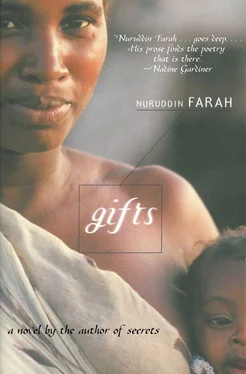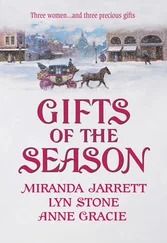Nuruddin Farah - Gifts
Здесь есть возможность читать онлайн «Nuruddin Farah - Gifts» весь текст электронной книги совершенно бесплатно (целиком полную версию без сокращений). В некоторых случаях можно слушать аудио, скачать через торрент в формате fb2 и присутствует краткое содержание. Год выпуска: 2011, Издательство: Arcade Publishing, Жанр: Современная проза, на английском языке. Описание произведения, (предисловие) а так же отзывы посетителей доступны на портале библиотеки ЛибКат.
- Название:Gifts
- Автор:
- Издательство:Arcade Publishing
- Жанр:
- Год:2011
- ISBN:нет данных
- Рейтинг книги:3 / 5. Голосов: 1
-
Избранное:Добавить в избранное
- Отзывы:
-
Ваша оценка:
- 60
- 1
- 2
- 3
- 4
- 5
Gifts: краткое содержание, описание и аннотация
Предлагаем к чтению аннотацию, описание, краткое содержание или предисловие (зависит от того, что написал сам автор книги «Gifts»). Если вы не нашли необходимую информацию о книге — напишите в комментариях, мы постараемся отыскать её.
Gifts — читать онлайн бесплатно полную книгу (весь текст) целиком
Ниже представлен текст книги, разбитый по страницам. Система сохранения места последней прочитанной страницы, позволяет с удобством читать онлайн бесплатно книгу «Gifts», без необходимости каждый раз заново искать на чём Вы остановились. Поставьте закладку, и сможете в любой момент перейти на страницу, на которой закончили чтение.
Интервал:
Закладка:
“It must be someone else you are confusing me with,” insisted the old woman.
“I meant to return the blanket, but didn’t for a number of complicated reasons, and therefore kept the episode as a private memory of an old woman’s kindness.”
“In that case,” the old woman said, “why devalue the significance of the act by mentioning it in public? Why must you speak of it?”
Taariq reflected on what the old woman said.
“She has a point,” Duniya agreed.
The old woman, her voice now confident and her eyes prepared to meet Taariq’s, said: “Is anything the matter with the baby? Why is he so quiet?”
No sooner had Duniya thought of what to say than the outside door opened, admitting the pot-bellied, perspiring figure of Qaasim. Like Shiriye, Qaasim had the eyes of a man who wanted to be somewhere else. He was very fat, like Shiriye, his body round like the lower part of a baobab tree, with stubby, short-nailed fingers. Qaasim’s eyes were small, his teeth tobacco-stained. His belly, it occurred to Duniya, had the shape of a cement-mixer. Qaasim, unlike Shiriye, spoke little. He let his money speak for him. Like an emperor with a full coffer to distribute, Qaasim gave and gave and gave. He left before people, praising or blessing him, got to the “Amen” of their prayers.
“Where is the little devil?” he said, in haste.
“What little devil?” asked Duniya.
“The little jinn that has created all this discord?”
The old woman looked as if she wished she had gone away earlier.
Duniya said, “When you come to someone’s home, you greet them first, you take a seat, you remain polite.”
“I said where is he?”
“Where are your manners?”
“Manners, listen to her talk of manners to me?” he addressed the old woman. “Where are your manners, Duniya? I’d like to know where your manners have gone, deciding to sever all relations with us, at a stroke. Don’t talk to me of manners.”
As the old woman prepared to leave, Qaasim said to her, “Do you know where the little devil is?”
“Of course, he is no devil — an angel maybe.”
“Where is he?”
“You know there are only two rooms here, since you own the place,” said the old woman angrily “Find him yourself.”
He gave heed to her advice and went to the Women’s Room. When eventually he re-emerged, he was not saying a word and was in no haste either. He took a seat, mournfully A blanket of sadness covered every inch of his large body, including his pot-belly, which appeared to have shrunk like a burst balloon.
Without being told so, Duniya knew the foundling had died.
As though he were a waterhole and all the others thirsty animals that had come to drink from it, everybody sat round Qaasim. Only Nasiiba and Duniya did not and they knew why Yarey, in her restless mood, sitting astraddle his knees, kept asking, “But why?” Yarey looked from Nasiiba, who had been the first to find him living, to Uncle Qaasim, who was the first to see him dead. Duniya, in a sad instant, did not put it past Qaasim to have strangled “the little devil who has created so much discord.”
The foundling’s death shook Duniya profoundly She could remember nothing that had ever touched her so deeply as his death. Nor could she be as philosophical about it as Taariq who had quoted the Somali proverb in which it is said that death saddens you less if it strikes a homestead far away from your own, or a camel herdsman whom you do not know. She asked herself what would become of Bosaaso and her myth-construct?
Bosaaso was the first to move away from those sitting round Qaasim’s waterhole. Agitated, his memory replayed a couple of sequences from two other deaths, his late wife and son. He stood still, rocking on his heels. He said, “Now we have to think of his burial and the bureaucratic rituals surrounding it.”
For a moment, Duniya hated him. How could a man so sensitive be so down-to-earth at the same time? She wondered if anyone had told him about the quit-order notice she had served on herself. And what was he likely to say when he had the opportunity to speak?
Taariq, on the other hand, had tear-stained cheeks and kept looking clumsily for a clean handkerchief, only discovering a crumpled tissue, dry with the holes of previous uses and mucuses, whenever he put his hand in his trouser pockets.
“I suppose we will have to submit the baby’s body to the mortuary for a post-mortem,” continued Bosaaso, “to find out why he died, and then submit six copies of the death certificate to the district police station where we registered him in the first placed.”
The old woman was the only person who went into the Women’s Room where the corpse was, keeping vigil, saying a few Koranic verses. She closed the window overlooking the road and covered the dead body with a sheet from Duniya’s cupboard.
Duniya wondered what would become of Bosaaso and her? Would something irrational like the foundling’s death demolish the symmetries they had constructed together?
At the foundling’s wake, anecdotes about death and creation myths were told. Present were a number of friends, including Mire, and all of Duniya’s immediate family. Mire told the first anecdote.
“A child dies in his sixth year and finds himself allotted to a lower berth than that occupied by a much older man who had died at sixty. The young boy says to God, ‘Why is it, Lord, that I have been offered a lower berth in heaven’s hierarchy than the grey old man here above me, when I haven’t lived long enough even to sin?’ And God responds: ‘Because this old man not only reached and lived beyond the age of reason, but he withstood all temptation without committing a single sin. That is why he has been rewarded well’ Unconvinced, the child then says, ‘I beg Your divine patience to tell me why I had to die young and wasn’t given the opportunity either to prove myself worthy of your rewards or that of sinning to deserve this punishment?’ God replies, ‘Because We knew you to be a sinner, and We spared you, for you would surely have earned Our disfavour if We had allowed you to live a moment longer. God is All-knowing, and Merciful.’ And so the child prostrates himself before the Almighty, Whose pardon he seeks, repeating the litany: God gives, He is All-knowing and Merciful.”
In the silence that followed this, Duniya got more drinks for those who wanted them. It was Bosaaso who had brought a crateful of ice-cold soda to the wake. For once, Duniya did not raise objections to receiving something from him. Now, she came back to where they all were, to hear Taariq tell a creation-myth.
“God, to while away His time, decided to create human beings, although not in his image, as the Bible says, but in the image of an Ethiopian. So He gives orders that clay be moulded in the shape of humans and fires be built to bake them. Then God stands to the side, watching His angel-assistants at work, and they bring to Him, with understandable excitement, a clay model as soon as one is ready to be shown to Him. The first one is overdone, too dark No good, says God. Allot this very dark creature to a forsaken place in the continent of Africa. The fire is lit afresh, another clay model is thrown in and then brought out, and God commands it to be assigned to Scandinavia. His comment being that it was too pale, no good either. The angels obliged. The same process is repeated again and again and again, until God finally gets what He wants: a model of handsomeness and of virtue, the right colour of skin, the right texture of hair, the right human intelligence and pride, everything. After viewing this special creature, God assigns him to Ethiopia. Gives to this creature the best of lands, the best weather, the best fruits the seasons offer. Makes him the envy of his neighbours, in short, the envy of all the races. And there came into being an Ethiopian.”
Читать дальшеИнтервал:
Закладка:
Похожие книги на «Gifts»
Представляем Вашему вниманию похожие книги на «Gifts» списком для выбора. Мы отобрали схожую по названию и смыслу литературу в надежде предоставить читателям больше вариантов отыскать новые, интересные, ещё непрочитанные произведения.
Обсуждение, отзывы о книге «Gifts» и просто собственные мнения читателей. Оставьте ваши комментарии, напишите, что Вы думаете о произведении, его смысле или главных героях. Укажите что конкретно понравилось, а что нет, и почему Вы так считаете.











